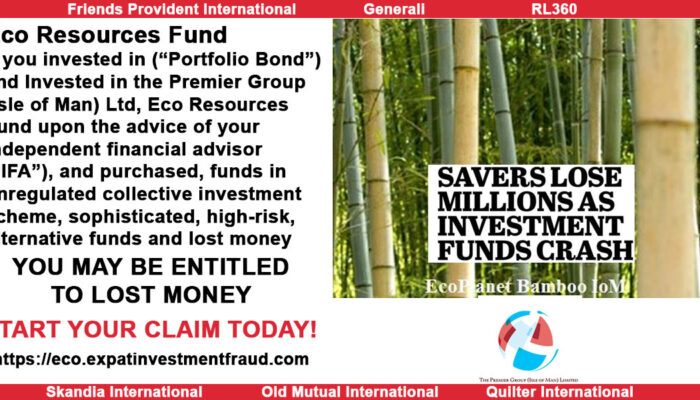EWAN LAMB concludes our trilogy on investors’ lost millions
The liquidator of the bankrupt Eco Resources Fund, which has cost shareholders and creditors in faraway bamboo plantations many millions of pounds, has been told the US finance company which now owns the forests may be willing to sell the assets back to ERF for $10 million.
Unfortunately the Isle of Man-based fund has only £12,555 in its coffers, and according to liquidator Gordon Wilson no-one “will be likely to invest or lend $10 million to the fund in current circumstances”.
Meanwhile, a report compiled by Mr Wilson suggests confusion reigns over who actually owns the plantations in Nicaragua and South Africa, which are part of an extremely complicated business set-up.
The Eco Fund was part of the Premier Group (Isle of Man) Ltd.’s empire which also included the worthless New Earth Recycling & Renewables [Infrastructure] Fund or NERR.
The NERR organisation, now also under investigation by a different team of insolvency experts, was meant to bankroll a £23 million waste treatment facility for the Scottish Borders before the deal was abandoned in 2015, leaving the local council’s strategy for garbage disposal in complete disarray.
Details of a meeting involving Mr Wilson and American businessman Troy Wiseman, founder of EcoPlanet Bamboo, which operates the plantations, have been made public for the first time. Mr Wiseman had also been an investor in Sustainable Asset Lending (SAL), believed to be the current owners of the bamboo real estate. Premier directors John Bourbon and Jamie Sutton were also present.
The report from Mr Wilson to investors, shareholders and creditors says: “Mr Wiseman opened the meeting by saying that he was attending as an inverstor in the fund and that he had no remaining executive role in or control over SAL. This was disappointing as we had believed that Mr Wiseman had control over SAL and it was on that understanding that we agreed to meet.
“For the avoidance of doubt, we still believe (based on our assessment of his conduct) that Mr Wiseman is involved with SAL as an investor and as either a controller or manager or influencer. Mr Wiseman then informed us that SAL had foreclosed on the plantation companies’ loans and that he had seen stock certificates in the plantation companies in SAL’s name”.
Mr Wiseman was then asked to provide evidence that the foreclosure had occurred, details as to who had done what, who knew what and when this all happened. “He agreed to provide these details and Mr Sutton has been following that up under our supervision.
“We don’t believe that Eco Bamboo Isle of Man or ERF ever gave permission to the plantation companies to include their shares as security for the SAL debts. This could prove to be a pivotal point if the fund is to retain or regain any interest in these plantations going forward”.
Since the meeting with Mr Wiseman in January, no information has been forthcoming from him or from SAL to demonstrate or explain what has happened to the plantations or shares in the various companies, wrote Mr Wilson.
“However, on a number of occasions since then, Mr Wiseman has indicated that SAL may be willing to sell the fund its plantations back for $10 million. Mr Wiseman knows all too well that the fund does not have $10 million. It is likely that as liquidator we will formally ask Mr Wiseman to provide evidence in order that we might better explain to you all what has happened”.
The report warns there are insufficient remaining liquid funds in the structure to pay for the cost of liquidation and “there are more than ample grounds to doubt that there will ever be any recovery from the bamboo plantations. We think it is unlikely that there will be any return on investment for investors or any dividend for creditors”.
The Isle of Man public purse will cover reasonable liquidation costs including costs to investigate and if necessary take action against those who may be accountable for the failure of the fund, said Mr Wilson.

